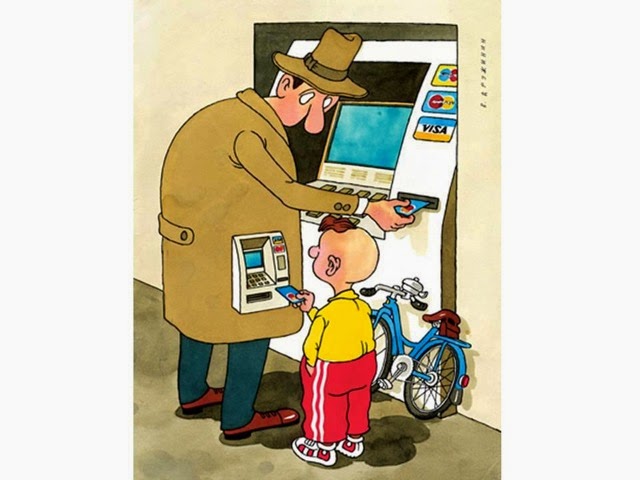HAPPY 4TH OF JULY, INDEPENDENCE DAY IN THE USA!!
Nuestro comentario sobre la gramática inglesa para hoy: Toma nota de cómo abreviamos los números en inglés. No te confundes con los 3 primeros ¡y los múltiples similares!
first = 1st
second = 2nd
third = 3rd
fourth = 4th
fitfth = 5th
sixth = 6th
seventh = 7th
eighth = 8th
nineth = 9th
tenth = 10th
twenty-first = 21st
twenty-second = 22nd
twenty-third = 23rd
¿Lo pillas?
Celebra más días con nosotros en….
INTERNATIONAL JAZZ DAY
VALENTINE’S DAY XOXO
Author: Mary Watson
Vocabulario en Inglés: Expresiones con “Dog”
Preposiciones en inglés: AT
 |
| Prepositions: He’s looking at her. |
Las preposiciones en inglés suelen dar bastante dolor de cabeza, como en todos los idiomas. Es uno de los puntos de la gramática inglesa que más problemas da. ¡Parecen tan poco lógicas! Mejor aprenderlas una a una, con unas frases que te ayudan a no confundirte en el futuro. Con calma.
Para hoy tenemos la preposición AT.
La preposición AT se usa para hablar del sitio, del tiempo y , como no, en unas expresiones típicas.
LA PREPOSICIÓN “AT” PARA HABLAR DEL SITIO
Tiene que ser un sitio que podemos considerar como un punto, no un sitio muy, muy amplio. Por ejemplo:
I’ll see you at the mall on Saturday.
Te veré en el centro comercial el sábado.
Consideramos que el centro comercial como un punto de referencia.
We’ll have dinner at my house tomorrow.
Cenaremos en mi casa mañana
We saw a great baseball game at the stadium last night.
Vimos un partido de baseball fantástico en el estadio anoche.
I met my husband at the dentist’s.
Conocí a mi marido en la consulta del dentista.
Where were you on Thursday? ¿Dónde estabas el jueves?
I was at the concert. Estaba en el concierto.
Oh, I thought you were at the pool. Pensaba que estabas en la piscina.
I live at 66 Old Street.
Vivo en el 66 de Old Street.
PERO…
I was in Africa for 3 years.
Estuve en África durante 3 años.
Africa es muy, muy grande y no lo consideramos como un punto. Los países y las ciudades, lo mismo. Consideramos que son sitios que te rodean, que estás dentro.
Unos ejemplos:
I studied in Mexico for 6 months. Estudié en Mejico durante 6 meses.
I live in Yonkers, New York. Vivo en Yonkers, New York.
I sat in traffic for 3 hours! ¡Estuve en un atasco durante 3 horas!
¡PERO OJO!
Quedamos en el parque.
I will meet you in the park. El concepto de estar dentro del parque que nos rodea.
I will meet you at the park. Consideramos el parque como un punto.
Oh dear. Esto se está complicando. Sorry! Vamos a complicarlo un poquito más…
Habrás notado que los verbos en los ejemplos son muy estáticos, no hay movimiento: see, were, study, meet, sit… ¿Qué pasa cuando hay movimiento? Depende del verbo. Muchas veces es TO…
I am going to the concert.
Voy al concierto.
My family moved to Austin when I was 6.
Mi familia se mudó a Austin cuando tenía 6 años.
Etc.
LA PREPOSICIÓN “AT” PARA HABLAR DE LA HORA
at 4 o’clock
at Christmas
at Easter
at night
at noon
at midnight
at the weekend ( in the us, on the weekend)
at the same time
at present
Notice that we say AT for @ .
TYPICAL MISTAKES YOU SHOULD AVOID:We arrived to the airport. Aigghh!!! ¡¡ Cuidado!!
Es correcto decir: We arrived AT the airport. (We arrived in Paris.)
LLegamos al aeropuerto. Llegamos a Paris.
NEVER “Arrive to”
I was looking the girl. No, no, no!
I was looking AT the girl.
Estaba mirando la chica.
What are you looking at?
¿Qué estás mirando?
OTHER EXPRESSIONS WITH “AT”
 |
| Don’t shout at me! = gritar |
 |
| I’m good at swimming. Soy buena en natación |
 |
| She’s pointing at us.= señalar |
 |
| She is at the computer = en el ordenador |
.
No te pierdas nuestro anterior post…
LA PREPOSICIÓN ON
¿Quieres aprender más inglés? LinguaSuite tiene el mejor curso de inglés online para ti. ¡Apuntate ahora en www.linguasuite.com.
Vocabulario inglés: Expresiones sobre el dinero
Hoy vamos a por el vocabulario en inglés relacionado con el dinero y los bancos, Business English.
Estas máqinas se llaman ATMs en inglés. ¿Tienes uno? Alguién te usa como uno?
BUSINESS ENGLISH
| ATM | cajero automático |
| teller | cajero o cajera en un banco |
| credit card | tarjeta de crédito |
| debit card | tarjeta de débito |
| cash | efectivo al contado |
| account | cuenta |
| bank charges | cargos bancarios |
| interest rate | tasa de interés |
| mortgage | hipoteca |
| loan (not a credit!!) | préstamo crédito |
| borrow | pedir prestado |
| lend | prestar |
| deposit | depositar |
| withdraw | reintegro |
| overdraft | descubierto |
| to be in the red | estar en números rojos |
| to be in the black | con saldo a favor |
| wallet | cartera o billetera |
Más vocabulario en inglés:
False Friends English Spanish
La Hora en Inglés
The Tree Leaves: English puns
Vocabulario inglés: The small print & the nake truth
 |
| ¡OJO CON LA LETRA PEQUEÑA!: THE SMALL PRINT |
Pero primer vamos a ver la foto de O’Donovan’s Irish Pub…
Siempre cuando lees algo, es importante fijarse en la letra pequeña, the small print. A que esta foto es un fantástico ejemplo.
De lejos, la letra grande se lee:
- Naked waitresses flirt with you.
- Camareras desnudas flirtean contigo.
Ah, pero no es así. No, no…. no tengas tantas fantasias. Con la letra pequeña, se lee de otra manera:
- The naked truth about our waitresses is that they only flirt with you to get a better tip.
- La verdad pura y dura de nuestras camareras es que solo flirtean contigo para conseguir una propina mejor.
El vocabulario inglés para hoy:
The small print = la letra pequeña
The naked truth = la verdad pura y dura
La palabra “naked” significa “desnudo” y se pronuncia /nei kid/ con la vocal de la segunda silaba muy, muy corta.
MÁS GRAMÁTICA & VOCABULARIO INGLES
PREPOSICIONES
FALSE FRIENDS ENGLISH SPANISH
SAYING YOUR AGE
Vocabulario inglés: Expresiones con “Laugh”
¡A que no puedes ver este vídeo sin reírte o por lo menos sonreír! El vocabulario en inglés para hoy va sobre el vocabulario en inglés–las expresiones con la palabra LAUGH.
Laugh your head off.
Reírte a carcajadas. (¡Hasta que se te caiga la cabeza!)
The movie was so funny! I laughed my head off!
¡La película era tan graciosa! Me reí a carcajadas.
Laugh out loud.
Reírte a carcajadas. (en voz alta)
When I saw Billy in that picture, I laughed out loud.
Cuando vi a Billy en esa foto, me reí a carcajadas.
Laugh at someone
Reírte de alguien.
Are you laughing at me?
¿Te estas riendo de mí?
Laugh something off
Quitar importancia
He failed his exam, but he just laughed it off.
Suspendió su examen, pero lo le importó.
Laugh all the way to the bank.
Disfrutar ganando dinero aunque los demás se ríen de ti.
A lot of people thinks she’s stupid, but she´s laughing all the way to the bank.
Mucha gente piensa que es tonta, pero ella está ganando un pastón.
Laugh in somebody’s face
Reírse en la cara de alguien
When he said I had to do the work all over again, I laughed in his face.
Cuando dijo que tenía que hacer el trabajo de nuevo, me reí en su cara.
Don’t laugh; it’s not funny.
No te rías. No tiene gracia.
I don’t know whether to laugh or cry
No sé si reírme o llorar.
Don’t make me laugh.
No me hagas reír.
Laugh and the world laughs with you, cry and you cry alone.
Ríete y el mundo se ríe contigo, llora y lloras solo.
MORE GREAT VIDEOS:
ENGLISH PRONUNCIATION CONFUSION
Opiniones LinguaSuite: THANK YOU CARD
 |
| THANK YOU, TOO! |
En inglés cuando se dice “Thank you“, se puede responder de diferentes maneras.
Unos ejemplos:
Susan: Thank you.
Frank: Thank you.
David: Thank you.
Silvester: Don’t mention it.
Patty: Thanks!
Peter: That’s OK.
Billy: Thanks a lot!
Ian: You’re welcome!
Jerry: Thank you very much!
Tom: It’s a pleasure
De todo corazón, a todos nuestros alumnos de LinguaSuite:
Preposiciones en inglés: On
 |
| THEY ARE ON THE SOFA WATCHING A MOVIE ON TV |
Vamos a centrarnos hoy en la gramática inglesa: las preposiciones.
ON: La preposición en inglés ON significa “en”, “sobre” o “encima de”:
ON the table = en la mesa, encima de la mesa
ON the roof = en el tejado, encima del tejado
ON the floor = en el suelo
ON the bridge = sobre el puente
También se usa la preposición ON en muchas frases donde el significado no es tan literal. Vamos a ver unos ejemplos:
Con los días de la semana:
I will see you on Monday. = Te veré el lunes.
Pero no si usamos NEXT o LAST
I spoke to Jenny last Tuesday.
Con la fecha completa de mes y día
My birthday is on the 22nd of July.
(¡ojo! My birthday is IN July.)
Con referencia a las cosas que están programadas:
My favorite program is on at 8 o’clock.
Mi programa favourite es a las 8.00.
What’s on at the movies this weekend?
¿Qué hay en el cine este fin de semana?
There’s a really good concert on tomorrow.
Hay un concierto buenísimo mañana.
Is the party still on?
¿Sigue en pie la fiesta?
Cuidado con asociar IN con EN:
The ball hit me on the head.
El balón me dio en la cabeza.
I play football on the local team.
Juego al futbol en el equipo local.
We are working on a project about artificial intelligence.
Estamos trabajando en un proyecto sobre la inteligencia artificial.
I saw it on TV.
Lo vi en la tele
On the train. = en (el) tren I like to read on the train.
On the plane. = en (el) avión I slept on the plane all the way to Chicago.
(But in the car!)
Presta atención a estos usos de la preposición ON
Are you here on business? No, I’m on vacation.
¿Estas aquí por negocios? No, estoy de vacaciones.
My car runs on diesel.
Mi coche funciona con diesel.
I’m running on empty.
Tengo el deposito vacio.
The train station is on fire.
La estación de tren está en llamas.
She has her coat on. = Tiene puesto el abrigo.
I have my hat on. = Tengo puesto el gorro.
Wait a minute! I’m on the phone!
Espera un momento. Estoy hablando por teléfono.
Ross is never on time.
Ross nunca llega a la hora.
What’s on your mind?
¿En qué estás pensando
The light is on.
La luz está encendido.
On and on = without stopping
He just talks on and on about the same things!
No hace más que hablar y hablar sobre lo mismo.
He’s on a diet.
Está a dieta.
¿Hay más usos de la preposición ON? ¡¡¡¡¡SI!!!!! ¡¡¡¡Muchos!!!!
Pero estos nos valen por hoy.
Puedes bajar este Language Bank de LinguaSuite con todos los usos de la preposición ON que has visto hoy:
¿Quieres aprender más preposiciones en inglés? ¿Mas INGLÉS?
Ya sabes, apúntate a uno de los 4 cursos de LinguaSuite. Elige él que más te guste en
¡LinguaSuite!
Pronunciación en inglés: ¡Confusiones!
Nos encanta este vídeo para aprender inglés con Geroge Bush. Te acuerdas de George Bush y Condolezza Rice ¿verdad? En esta conversación supuestamente entre ellos verás que más que COMUNICACIÓN lo que hay es ¡CONFUSIÓN!
¿Por qué? ¡Por la pronunciación en inglés! Otra vez más la pronunciación nos puede traer problemas, ya que la pronunciación en inglés tiene mucho que ver con la comprensión. Mira estas palabras, ¡suenan igual!
Hu = Who
Yassir (Arafat) = Yes, sir
Koffi (Annan) = Coffee
¿Has oído como el supuesto George W. Bush pierde la paciencia y acaba espetando ‘You’re pissing me off, Condie’ ? Algo como ‘me estás tocando la moral, Condie’.
Y nosotros, ¿qué hacer cuando no hemos entendido el mensaje o el contexto?
Muy fácil, hay que expresarlo de manera clara y natural, sin ningún tipo de vergüenza ni pasando apuros. No podemos pretender entender todo, así que a veces hay que parar y pedir que nos clarifiquen lo que nos están contando.
¡De lo contrario, acabaremos como George Bush y Condolezza Rice en el vídeo!
Para evitar malentendidos, lo mejor es conocer y tener en cuenta las siguientes expresiones en inglés:
- Expresar que no hemos entendido algo
· I beg your pardon?
· I beg your pardon, but I don’t quite understand.
· I’m not quite sure I know what you mean.
· I’m not quite sure I follow you.
· I don’t quite see what you mean.
· I’m not sure I got your point.
· Sorry, I didn’t get your point.
· I don’t quite see what you’re getting at.
- Pedir que nos aclaren algo
· What do you mean by…?
· Do you mean…?
· Could you say that again, please?
· Could you repeat please?
· Could you clarify that, please?
· Would you elaborate on that , please?
· Could you be more explicit?
· Could you explain what you mean by…?
· Could you give us an example?
· I wonder if you could say that in a different way.
· Could you put it differently, please?
· Could you be more specific, please?
- Ofrecer aclaraciones
· Let me explain that…
· Let me explain that in more detail…
· Let me put it in another way…
· Sorry let me explain…
· In other words…
· To say this differently…
· To put it differently…
Bajar LinguaSuite Language Bank-Clarifications pdf
¡Así que, nada de cortarse a la hora de hacer preguntas si no hemos entendido algo!
Más vídeos para aprender inglés de LinguaSuite:
Distintos Acentos
Piss or Peace?
The Auction
Errores comunes en inglés – I don’t think
Un error en inglés que es muy común y que cometen las personas que hablan español es el uso de I DON’T THINK.
En español, decimos:
Se usan las dos formas con naturalidad.
En inglés no es exactamente igual. Normalmente la forma negativa de I THINK es I DON’T THINK.
OK, ¡STOP! Ya oigo todas las voces diciendo que esa frase significa que no piensas. Pues, no. Realmente es cómo decimos Creo que no.
Vamos a ver unos ejemplos:
I don’t think Maggie is coming today. We didn’t think you would get here on time! Do you want to come? No, I don’t think so. I don’t think this is going to work. |
Creo que Maggie no viene hoy. Creíamos que no llegarías a la hora. ¿Quieres venir? No, creo que no. No creo que esto vaya a funcionar. |
¿Es posible decir en inglés I think it’s not going to work? Sí, es possible. Es más contundente., pero en general es una buena idea decir I don’t think… Lo contrario te puede llevar a decir cosas que “suenen raro”.
¿Os he convencido? Hmmm, I’m not sure…. I don’t think so. Así que vamos a escuchar dos canciones en inglés:
I Don’t Think I Love You (necesitas Abode Flash Player para ver el vídeo)
I Don’t think I’ll Love Anymore
I am here, on a Sunday morning
The day that you said you were walkin’ away
Dyin’ here, but I don’t want to wake you
As long as you’re sleeping, you’re here
So I’m wishing you well, though it hurts, can you tell?
I wont try to stand in your way
This world keeps turning, the sun will shine on
But I don’t think I’ll love anymore
Lying here, so cold this morning
Pretend that I’m sleeping, afraid that you’ll see
That I’m dyin’ here, I don’t want to hurt you
If only you’d ask me to stay
So I’m wishing you well, though it hurts, can you tell?
I wont try to stand in your way
This world keeps turning, the sun will shine on
But I don’t think I’ll love anymore
We don’t say a word, a moment passes
By end of the day, you’ve gone on your way
And I’ll ask myself, have I missed all life’s chances
For now, all I can say is that
I’m wishing you well, though it hurts, can you tell?
I wont try to stand in your way
This world keeps turning, the sun will shine on
But I don’t think I’ll love anymore
No, I don’t think I’ll love anymore
Más errores comunes en estos posts:
EL VERBO HAVE
WOULD YOU LIKE & DO YOU LIKE
INSTEAD OF
PREFER
PRESENT PERFECT





